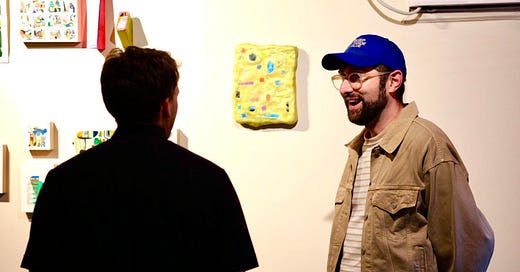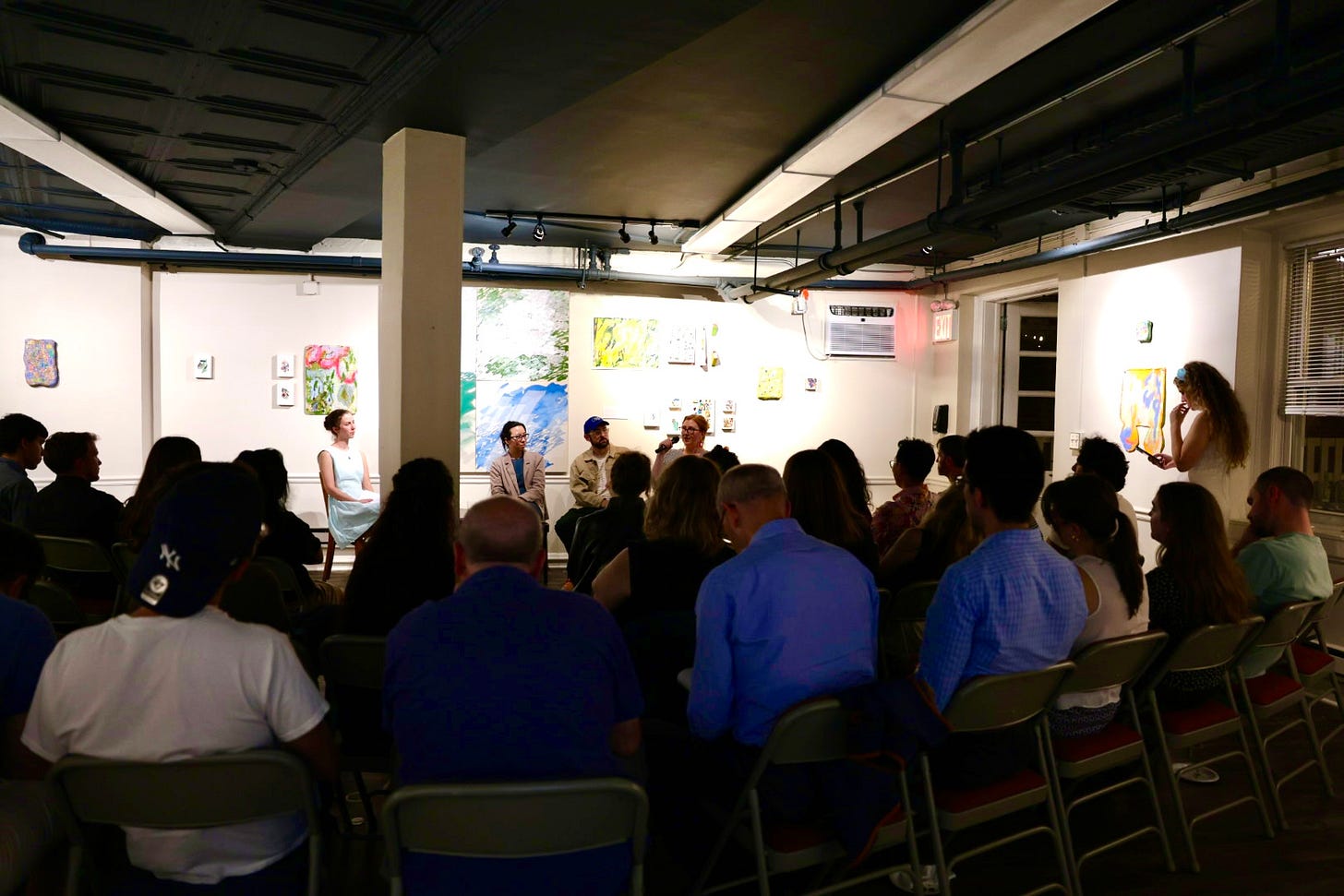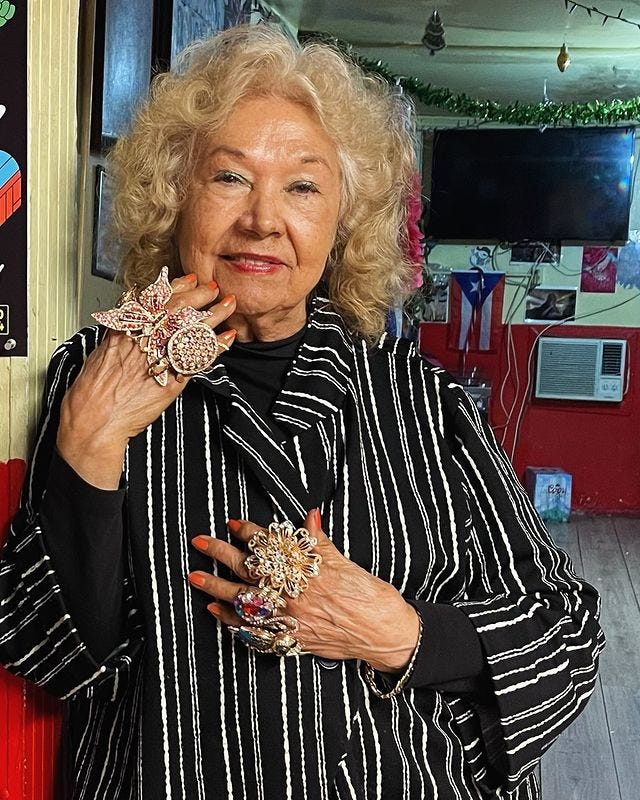In her address to the DNC, Oprah Winfrey exhorted attendees to “choose joy”...which according to her goes hand-in-hand with voting for Kamala Harris. While the plethora of memes being churned out about Brat Kamala and being “coconut-pilled” have admittedly been a bit entertaining, I can’t say they’ve filled me with joy. Nor can I help but be skeptical about any association between the establishment left–with its puritanical self-serious attitude toward all things social justice related–and any notion of merriment (take the aversion to cigarettes and jokes based on stereotypes). And while those leaning right are generally much less moralistic and more amenable to humor and theatrics, I often fear that their excessively reactionary posturing tends to either dampen their playful spirit or lead it into legitimately morally-concerning territory (i.e. race science and overt misogyny).
The struggle to “dance” within the tension between “order and surprise,” and to maintain a healthy and productive sense of play was the theme of an art show hosted last week in East Harlem by the collective known as Arthouse2B–at which several Compact contributors and readers were present. The three artists whose work was featured in “Playing Around” took up G.K. Chesterton’s insistence that “it might be reasonably maintained that the true object of human life is play,” and aimed to explore “the experience of forgetting how to play as we become adults,” which seems to be even more challenging “after crossing the threshold of the pandemic.” What emerged from the collection of colorful, experimental prints and installations was a refreshing sense of measured and compelling joyfulness, which was a welcomed break from the turbulent political discourse bombarding my feeds.
This week in Compact
As the Democratic National Convention came to a close, Sohale Mortazavi broke down the eccentric variety of protestors and counte-protestors he encountered while outside the convention center. The “cheap pranks and hollow imagery” both inside and outside the convention, he wrote, recalled Debord’s musings about the spectacular society.
In spite of the DNC’s heavy reliance on “vibes-based blitz,” Justin Vassallo lauds Harris’s substantial economic policy platform, which, building on Biden’s “pro-growth” populist fusionism, aims to “empower workers and broaden entry to the middle class.” Yet Vassallo expresses concern that “maintaining airtight unity in a party that increasingly represents upscale voters means she will be under pressure to pacify comfortable professionals and elite donors wary of deeper economic reforms.”
John B. Judis recognizes several parallels between the 2016 and 2024 presidential campaigns, namely that both parties will “rely on similar coalitions to carry them to victory.” Yet Harris, he asserts, “seems to have learned something from Clinton’s failures.” Harris “has largely eschewed identity politics” and avoids “the pseudo-historical narrative…that the United States today is in a political situation equivalent to those in interwar Italy or Germany, and that Trump is a fascist or even a neo-Nazi.” Judis goes as far as saying that he “wouldn’t be surprised if Harris, like Biden in 2020, comes out the winner in their debate.”
Harris’s pledge at the DNC “to sign the bipartisan(-ish) immigration package negotiated earlier this year by Senate Democrats and a handful of Republicans” was “framed as a ‘flip-flop’ by the left and right alike.” But upon further investigation, says Sohrab Ahmari, it “is actually a lot less dramatic.”
The Trump and Harris campaigns have proposed varying solutions to the problem of tipping–which 3 of 4 Americans say has gotten “out of control.” Alex Park talked to several waiters about the prospect of getting tax-breaks from their tips, which he acknowledged “might give managers a reason to forestall a future pay raise, but in an industry dead set against paying employees more under any circumstances, it’s hard to imagine them needing the excuse.” Though no definitive solution is likely to be found in the near future, Park urges to “tip your server in cash.”
Though RFK Jr.’s “environmentalist bona fides are welcome news for Republicans who feel their party should return to the commitment to stewardship and conservation,” Compact contributing editor Emmet Penney fears that “for anyone who shares the basic Trumpian populist commitment to rebuilding the US industrial base, RFK Jr.’s long history of opposing energy abundance should raise serious concerns.” To avoid “undermin[ing] any attempts to revitalize domestic manufacturing, compete with China, fabricate microchips, or power artificial-intelligence computation,” Trump’s team should keep RFK away from “agencies that deal with American energy.”
Be sure to listen to the team discuss RFK Jr. and Tulsi Gabbard joining forces with the Trump campaign on this week’s podcast, as well as the latest episode of Blame Theory in which Geoff Shullenberger interviews author and filmmaker David Shields about the extent to which we can blame the postmodernists for our current social malaise.
In the face of growing threats of “barbarism” from Islamists, Russia, and China, too many disregard the virtues of Western civilization–falsely equating it with its excesses–or advocate for a reactionary form of neoconservative Western supremacy. “The generational task,” writes Adrian Pabst, “is to tell a Western civilizational story against nihilistic myths of race, either reactively triumphalist or progressively self-loathing. A renewed geocultural West is vital if we are to avoid sliding into World War III and start building bridges between competing civilizations, over and against barbarous forces old and new.”
The popular The History Channel series Ancient Aliens, which will soon conclude its 20th season, has “pioneered an increasingly influential brand of pseudo-history,” writes Adam Sacks, “driven by a systematic disregard for intellectual antecedents….It is also a sort of esoteric wokeness: a pessimistic politics of the oppressed according to which elites have deprived humanity of the grandeur of a spiritual backstory.”
Finding spontaneity in the ruins
The matter of proposing legislation that will adequately confront problems related to tipping is challenging in part because the problem stems from both cultural and economic factors. In an ideal world, we would—as I suggested in my newsletter a few weeks ago—learn from the Europeans and get rid of tipping altogether. In the words of the ever-hyperbolic Baudrillard, the customer service-conscious waiter functions as an “apostle of the social machine” whose mission is “the gratification, the lubrication of social relations with the institutional smile.” Yet behind the forced “warmth” of the waiter’s smile seethes frustration, exhaustion, and resentment toward the thought of becoming functionaries of a “tentacular superstructure which goes far beyond the simple functionality of social exchange to form a ‘philosophy,’ a value system for our technocratic society.” But above all, the normalization of such contrived congeniality results in the “loss of spontaneous, reciprocal, symbolic human relations.”
Though Williamsburg, Brooklyn is generally known for being a bastion of artificial community and culture, the Puerto Rican social club known as “Toñita’s” (the nickname of its proprietress, Maria Antonia Cay) is a welcomed exception to the neighborhood’s norm. Founded 50 years ago last month, and modeled on the traditional social clubs found in Puerto Rico, Toñita’s is a place for locals and visitors to chat and dance with strangers, play dominos and shoot pool, and eat free food and sip on shockingly cheap drinks (in Brooklyn, $4 cocktails is nothing short of a miracle) served by the 84-year-old Toñita, who is usually sitting behind the bar decked in numerous rings and brightly-colored necklaces.
Much like New York and New Jersey’s various other ethnic social clubs founded in the early 1900s, Toñita’s is a space for casual conviviality as well as for social support—it was common for patrons to gather funds to help out a community member in need or to connect each other with job opportunities. The sense of community remains strong, as patrons showed up in front of the Municipal Building to protest a city inspector who was threatening to shut the club down last year. The club has drawn in a younger crowd thanks to celebrities like Madonna, Bad Bunny, and Nicky Jam who have recently celebrated album releases or done photo shoots there.
Summer nights are usually the most boisterous. Last Friday, I squeezed into the crowded backyard space and made conversation with random people, as one guy pulled out a JBL speaker and started blasting reggaeton and classic salsa, which everyone joined in singing along to. I left feeling relieved that I don’t have to travel all the way back to Europe to experience such spaces of spontaneous warmth and festivity.








